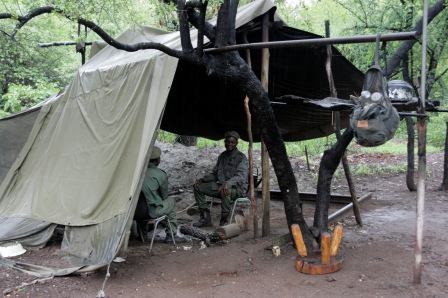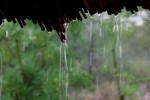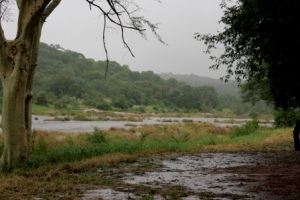7 Dec 2011
Have you ever been close to a rhino?
The first time I had the opportunity to study these strange behemoths at really close range was some years ago, on a South African game ranch that’s home to a large herd of them. You want to take good photo’s? John had asked. Come with me at four, that’s when the whites come out of the bush for their feed.
At four John was reading his book in the truck while I sat waiting on the ground near the feeding troughs, as instructed. (Not without trepidation, I may add.)
It wasn’t long before they appeared. One moment there was nothing but bush and the next these great grey beasts were approaching me from all sides. I sat frozen as they lumbered up, sniffing the air and stopping close by to try and fathom me with their limited eyesight. Once satisfied however, they passed right by and got stuck into their dinner.
It was a huge moment for me. What struck me most was their sheer size and the prehistoric air of their form and thick skins. They looked almost mechanical in nature but from up close small movements of the eyes, ears and nostrils gave life and character to the bulldozers. I was amazed too, despite it being the second largest terrestrial mammal on earth, at how quietly a rhino can move. If anything, one hears breathing rather than footsteps.
Another time, about ten years ago, I was driving around with the legendary Jan Oelofse on his game ranch in northern Namibia when word came over the radio that a certain rhino had been spotted. Jan drove to the area, got out and started calling. Soon enough a black rhino bull came along and approached us. It was one that Jan had raised as an orphan and then released into the wilds.
‘Tame’ or not, the black rhino, although slightly smaller than the white, has a reputation as a bad-tempered customer and I was none too keen on being so close to one. Relax, Jan said. Give him your breath. Let him smell you so he can identify you.
So there I was, trying to blow into a black rhino’s nostrils while trying to hold my breath at the same time. Another huge moment.
I got a very firm idea of the bulk of these animals when the bull nudged me with its head. I tried to resist its shove but it was like trying to push a concrete wall.
And then the most amazing thing happened.
Stand back, Jan said. He moved to the rhino’s side, laid his hands on its back and flank, said something to it, and lo and behold: The great beast lay down!
Right, said Jan. Now you can take your pictures…
(Jan Oelofse of course, is an animal whisperer of note. Famous as the man who invented the method that made the mass capture and translocation of game as we know it, possible, he was also one of the early pioneers of game capture and –taming. He hails from the old East Africa days where he, amongst other things, trained wild animals for the movie Hatari in which John Wayne starred.)
Well, today I touched a rhino again.
Man Friday went to show me the scattered remains of a cow that was butchered by poachers in June. The skull, with its hideously severed nose was light when I picked it up. There was no breath, no fixating eye, no life.
But it was still a huge moment.
For all the wrong reasons.































